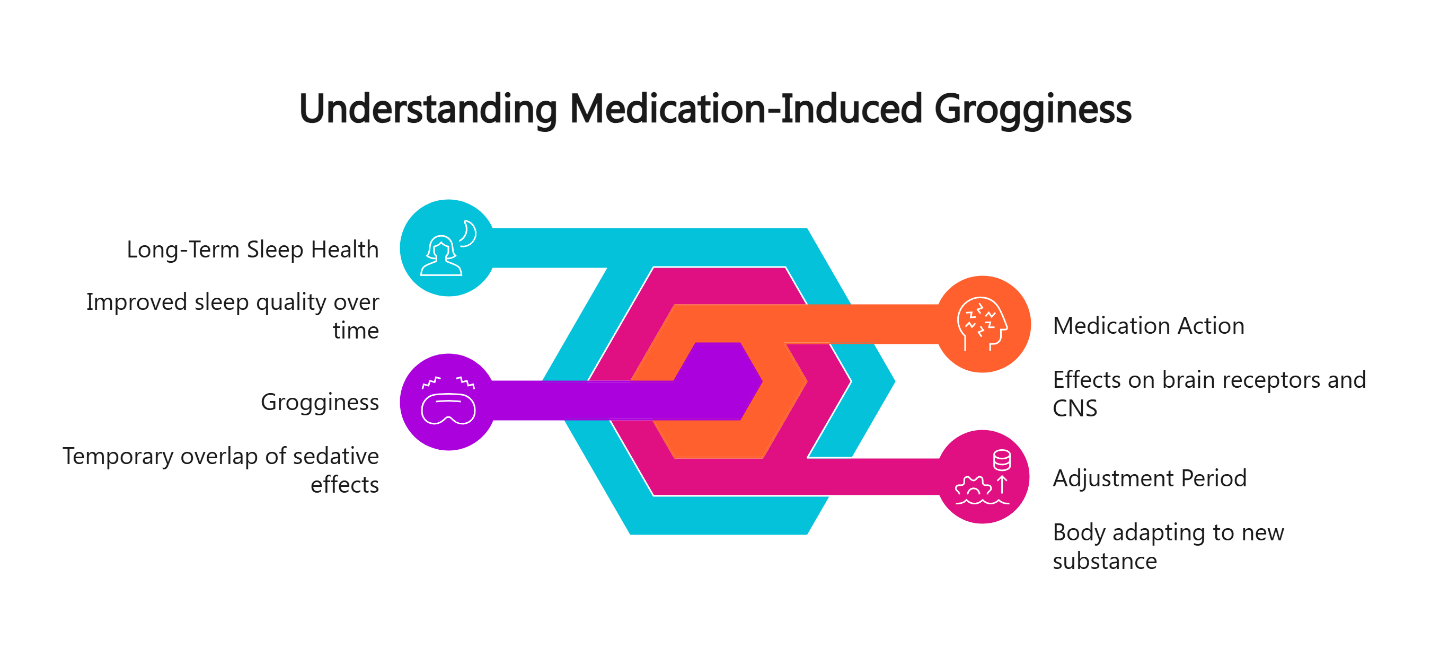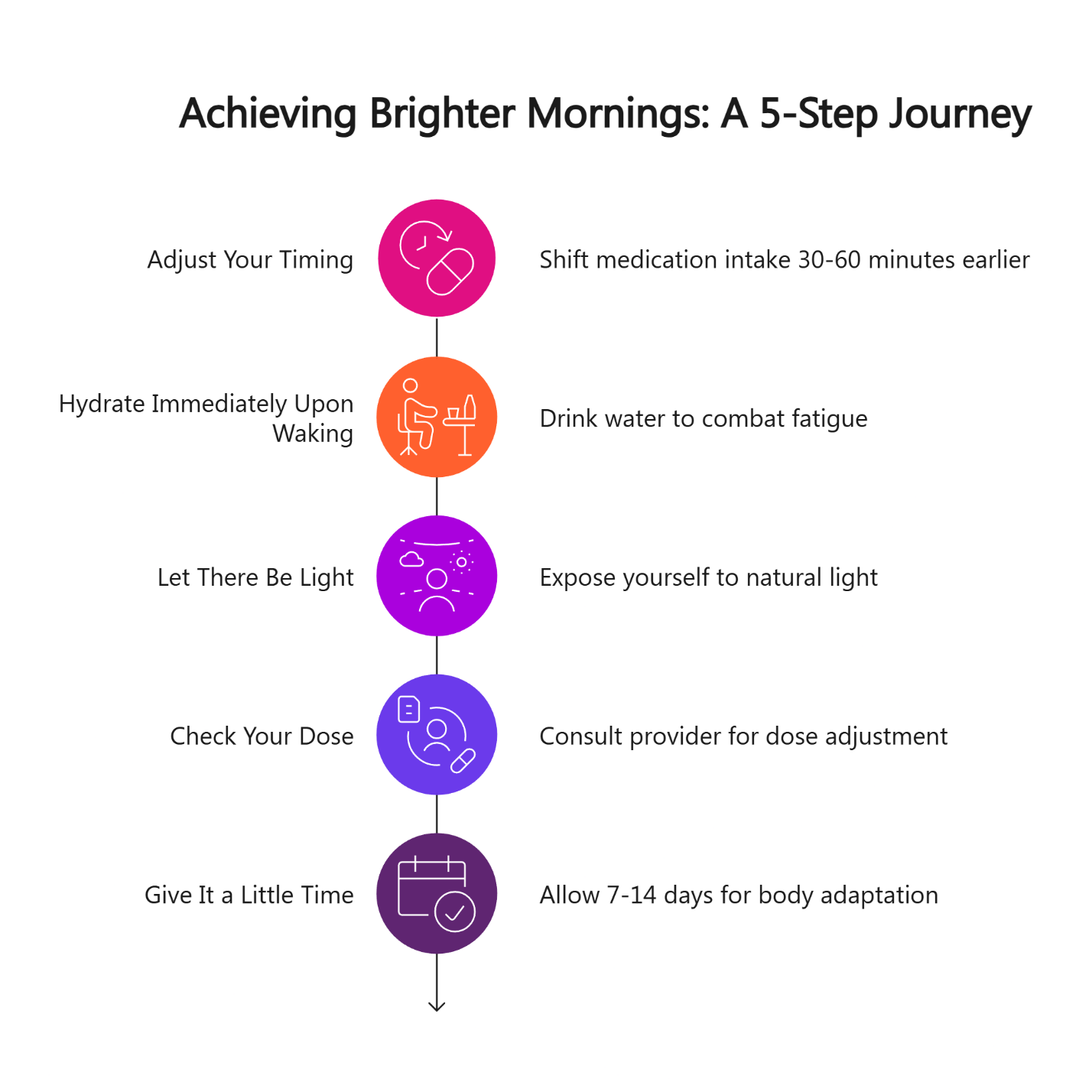📌 Key Takeaways
Morning Grogginess is a Common, Manageable Adjustment: Morning tiredness after starting medications like Trazodone or Hydroxyzine is a well-documented side effect that many people experience as their body adjusts to new treatment. This grogginess typically indicates the medication is working to promote restorative sleep, not that something is wrong.
Simple Timing Changes Can Make the Biggest Difference: Taking your sleep medication 30-60 minutes earlier in the evening may help eliminate morning grogginess by giving the medication more time to work through your system before wake-up time. This single adjustment often provides the most significant improvement in morning alertness.
Five Practical Strategies Support the Adjustment Process: Immediate hydration upon waking, natural light exposure within minutes of getting up, proper timing adjustments, dose optimization with your provider, and allowing 7-14 days for your body to adapt can help minimize grogginess during the initial adjustment period.
Professional Guidance is Essential for Dose Optimization: Individual metabolism varies significantly, so what works for one person may be too strong for another. Contact your healthcare provider if grogginess persists beyond two weeks or significantly impacts daily activities like work or driving safety.
Adjustment Leads to Long-Term Sleep Success: Managing this temporary side effect represents a crucial step in building sustainable, healthy sleep habits that support long-term wellness goals, transforming both nighttime rest and daytime energy.
These strategies help you navigate the initial adjustment period while your body adapts to finally getting the restorative sleep it needs. This content is for informational purposes only and does not constitute medical advice. Consult with a qualified healthcare professional for individual circumstances and treatment decisions.
That “Sleep Hangover” is Normal—and Manageable
The alarm goes off. You reach over, hit snooze, and immediately notice that thick, cloudy feeling in your head. Your body feels heavy, like you’re moving through molasses.
You took your new sleep medication last night and finally got the rest you’ve been craving for months. But now? This groggy, “sleep hangover” feeling has you wondering if something’s wrong.
Here’s the thing—you’re not alone in this experience. Feeling a little sluggish in the morning? You’re not alone. It’s a common, manageable adjustment on the path to better sleep. Morning grogginess is a well-documented side effect that many people experience when starting medications like Trazodone or Hydroxyzine as their body adjusts to the new treatment.
What you’re experiencing isn’t dangerous. It’s actually a sign that your medication is doing its job—promoting the deep, restorative sleep your body has been missing. The grogginess simply means the timing or dose might need a small tweak.
Think of this adjustment period as fine-tuning a musical instrument. The basic structure is sound, but a few minor adjustments will help you hit the perfect note between restful nights and energized mornings.
Why You Might Feel Groggy at First: Understanding the Adjustment Period

Morning grogginess occurs when sedative medications haven’t fully cleared your system by wake-up time. This creates a temporary overlap where the medication’s sleep-promoting effects linger into your morning hours.
Medications like Trazodone work through their effects on specific brain receptors, including histamine and adrenergic receptors, which produce sedative effects. This action on neurotransmitter systems results in increased slow-wave sleep—the deepest, most restorative sleep stage. Hydroxyzine reduces central nervous system activity through its antihistamine properties. Both are designed to help you fall asleep and stay asleep.
The grogginess isn’t a flaw in the medication. It’s your body learning to process and metabolize a new substance. Most people find this side effect diminishes significantly within the first week or two as their system adapts.
Peace of Mind: This adjustment period is well-documented and completely normal. Unlike dependency-forming sleep aids, these medications work with your body’s natural sleep processes, making any initial grogginess a temporary bridge to better long-term sleep health.
Your 5-Step Toolkit for Brighter Mornings

These practical strategies can help minimize morning grogginess while your body adjusts to your new sleep medication:
Adjust Your Timing
Taking your medication 30-60 minutes earlier in the evening often eliminates morning grogginess entirely. If you’ve been taking it at 10 PM, try 9 PM or 9:30 PM instead.
This simple shift gives the medication more time to work through your system before your alarm sounds. Many people find this single adjustment makes the biggest difference in how they feel upon waking.
Pay attention to how the timing change affects both your ability to fall asleep and your morning alertness. You might need to experiment for a few nights to find your sweet spot.
Hydrate Immediately Upon Waking
Dehydration amplifies feelings of fatigue and mental fog. Keep a full glass of water on your nightstand and drink it before you even get out of bed.
Your body becomes mildly dehydrated during sleep, and this natural water loss can make medication-related grogginess feel more intense. Immediate rehydration helps kickstart your body’s morning processes.
Some people find that adding a pinch of sea salt or a splash of lemon juice makes the water more effective at combating morning sluggishness.
Let There Be Light
Natural light exposure within 10 minutes of waking helps reset your circadian rhythm and signals to your brain that it’s time to be alert. Open your blinds immediately or step outside for a few minutes.
Light exposure triggers the suppression of melatonin and the release of cortisol—your body’s natural wake-up hormone. This biological process helps counteract any lingering sedative effects from your medication.
Even on cloudy days, outdoor light is significantly brighter than indoor lighting and more effective at promoting alertness.
Check Your Dose
Your current dose might be slightly higher than what your body needs for effective sleep. Individual metabolism varies significantly, and what works perfectly for one person might be too strong for another.
Don’t adjust your dose on your own. Instead, contact your provider to discuss whether a lower dose might give you the same sleep benefits with less morning grogginess. [REF::https://sleepscriptmd.com/returning-patients/]
As one patient shared: “Took a couple of tries to find the right thing, but what I have now works pretty well.” This adjustment process is completely normal and shows your provider is committed to finding your optimal treatment.
Long-Term Value: Getting your dose right now saves you from weeks of unnecessary grogginess and ensures you’ll stick with a treatment that can provide years of better sleep and improved health.
Give It a Little Time
For many people, morning grogginess naturally diminishes within 7-14 days as the body adapts. Your liver becomes more efficient at processing the medication, and your sleep patterns stabilize.
Another patient noted: “It took a couple of tweaks to get the right prescription, but now I’m finally sleeping through the night.” This patience during the adjustment period often pays off with significantly improved sleep quality.
Track your morning alertness on a simple 1-10 scale for two weeks. Many people notice gradual improvement even when day-to-day changes feel subtle.
When to Talk to Your Provider
Contact your healthcare provider if morning grogginess persists beyond two weeks, significantly interferes with daily activities, or feels severe enough to impact work or driving safety.
These situations warrant professional evaluation:
- Grogginess that doesn’t improve after trying the timing and lifestyle adjustments above
- Feeling so drowsy that you’re concerned about driving or operating machinery
- The grogginess is accompanied by other concerning symptoms
Your provider can assess whether a different medication, a lower dose, or additional strategies might work better for your individual situation. [REF::https://sleepscriptmd.com/faqs/]
Remember, the goal is sustainable, refreshing sleep without compromising your daytime energy and productivity.
Better Sleep and Better Mornings Are Within Reach
That groggy feeling you woke up with this morning? It’s not a permanent fixture of your new sleep routine. It’s simply your body’s way of adjusting to finally getting the restorative sleep it needs.
The simple strategies we’ve covered—adjusting timing, immediate hydration, light exposure, dose optimization, and allowing time for adaptation—can transform those foggy mornings into energized starts to your day.
Most importantly, remember that managing this temporary side effect is a crucial step in building the sustainable, healthy sleep habits that will serve your long-term wellness goals. Every small adjustment you make now is an investment in years of better rest, improved mood, and enhanced daily energy.
You’re not just treating insomnia—you’re reclaiming your nights and, ultimately, your days.
Still not sure what’s impacting your rest? Take our Sleep Clarity Quiz to get more insight.
This article was drafted with AI assistance and has been reviewed, fact-checked, and edited by the expert humans on our Insights Team to ensure accuracy and clarity.
About the SleepScriptMD.com Insights Team
The SleepScriptMD.com Insights Team is our dedicated engine for synthesizing complex topics into clear, helpful guides. While our content is thoroughly reviewed for clarity and accuracy, it is for informational purposes and should not replace professional advice.
